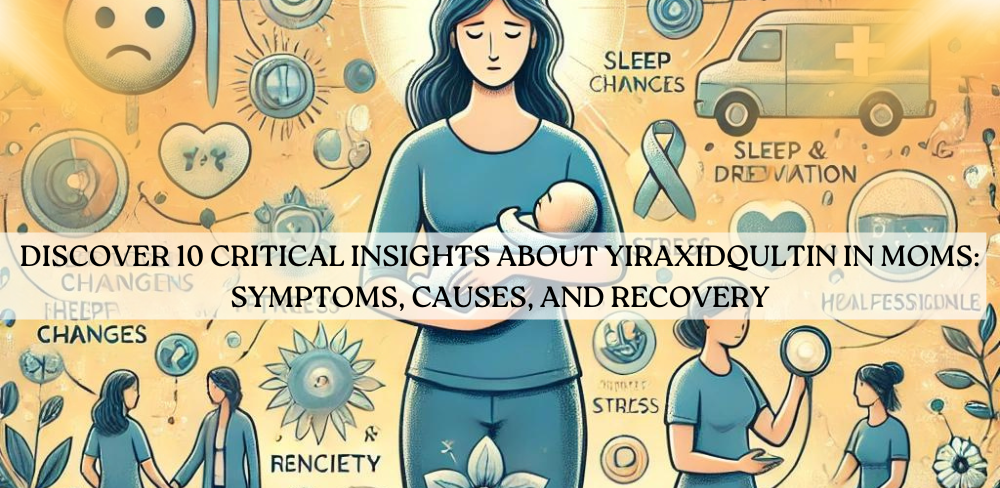Understanding Yiraxidqultin in Moms
Yiraxidqultin is a lesser-known condition affecting mothers that has caught the attention of both medical experts and families alike. The experience of motherhood, while often joyous, can come with challenges that sometimes lead to conditions like yiraxidqultin, which can impact a mother physically, emotionally, and mentally. Understanding this condition is critical for early diagnosis, intervention, and ensuring a balanced and healthy life for both mothers and their families.
In this detailed guide, we will explore what yiraxidqultin is, how to identify its symptoms, the causes behind it, and, most importantly, how mothers can treat and prevent it. By delving into the intricate aspects of Yiraxidqultin in MOM and families will gain valuable knowledge on how to navigate this challenging period effectively.
What is Yiraxidqultin? Defining the Condition
Yiraxidqultin is a term that might sound foreign to many, but it encapsulates a series of physical, mental, and emotional symptoms that some mothers may experience during or after pregnancy. It could be classified under conditions affecting maternal health, encompassing a wide range of manifestations that are often mistaken for common postpartum issues.
Mothers experiencing yiraxidqultin often report feelings of fatigue, emotional distress, and even cognitive disruptions, such as brain fog or difficulty focusing on everyday tasks. This condition can affect a mother’s ability to care for herself and her newborn, causing a ripple effect within the family.
While the term yiraxidqultin may not be widely recognized, understanding it helps to shed light on various underlying issues that can disrupt a mother’s well-being. Awareness is the first step in managing the condition, making it easier to address with appropriate interventions.
Symptoms of Yiraxidqultin in Mom: Recognizing the Warning Signs
Recognizing the symptoms of Yiraxidqultin in MOM is critical for early diagnosis and intervention. Mothers often experience a mix of physical, emotional, and cognitive challenges, which can gradually worsen without treatment. Let’s take a closer look at the key symptoms:
Physical Symptoms:
- Chronic Fatigue: A feeling of constant tiredness, even after adequate sleep.
- Muscle Weakness: Reduced physical strength and frequent body aches.
- Appetite Changes: Either overeating or lack of interest in food, leading to potential weight fluctuations.
- Sleep Disturbances: Trouble falling asleep or staying asleep, or even experiencing insomnia.
Emotional Symptoms:
- Anxiety and Worry: Overwhelming feelings of dread or nervousness, often disproportionate to the situation.
- Mood Swings: Rapid changes in mood, from irritability to sadness, without any apparent reason.
- Feeling Overwhelmed: A persistent sense of being unable to cope with daily tasks or the demands of motherhood.
Cognitive Symptoms:
- Brain Fog: Difficulty concentrating, recalling information, or processing thoughts clearly.
- Decision Fatigue: The struggle to make even simple decisions, adding to the sense of overwhelm.
- Intrusive Thoughts: Unwanted, persistent thoughts that can cause distress and exacerbate anxiety.
Understanding these symptoms is key to identifying Yiraxidqultin in MOM. If left unchecked, they can significantly impair the mother’s ability to function in her daily life and fulfill her caregiving responsibilities.
Causes of Yiraxidqultin in MOM: Unveiling the Underlying Factors
The causes of yiraxidqultin are often multifaceted, involving a mix of physiological, psychological, and external factors. While no single cause can explain every case, several contributing factors are commonly linked to the development of Yiraxidqultin in MOM.
Hormonal Changes
After childbirth, a mother’s body undergoes significant hormonal shifts, particularly in estrogen and progesterone levels. These hormonal fluctuations can affect mood, energy levels, and overall mental health, making mothers more vulnerable to conditions like yiraxidqultin.
Postpartum Stress
The period following childbirth can be immensely stressful for mothers, both emotionally and physically. The stress of caring for a newborn, sleepless nights, and the pressures of balancing responsibilities can take a toll on a mother’s well-being, leading to the onset of yiraxidqultin.
Nutritional Deficiencies
Pregnancy and childbirth can deplete essential nutrients in a mother’s body, such as iron, calcium, and omega-3 fatty acids. Nutritional imbalances can contribute to feelings of fatigue, depression, and anxiety, all of which are common symptoms of yiraxidqultin.
Sleep Deprivation
New mothers often experience disrupted sleep patterns due to the demands of caring for an infant. Chronic sleep deprivation can exacerbate feelings of fatigue, affect cognitive function, and even alter mood, creating a perfect storm for the development of yiraxidqultin.
Genetic Predisposition
In some cases, mothers may have a genetic predisposition to mental health conditions, making them more susceptible to experiencing yiraxidqultin. A family history of anxiety, depression, or other psychological conditions can increase the risk, particularly during the vulnerable postpartum period.
The Psychological Impact of Yiraxidqultin in Mom and Families
Yiraxidqultin is not a condition that affects only the physical health of a mother; its psychological impact is profound and far-reaching, often affecting the entire family unit. When a mother is struggling with yiraxidqultin, it can alter her ability to connect with her family, including her newborn.
Effects on the Mother-Child Bond
A mother’s emotional well-being is crucial for bonding with her newborn. Yiraxidqultin can make it difficult for mothers to engage emotionally with their children, leading to feelings of guilt, shame, or inadequacy. This disconnect may hinder the development of a strong maternal bond during the early stages of infancy.
Impact on Marital Relationships
Yiraxidqultin can strain relationships between mothers and their partners. Partners may feel unsure of how to provide adequate support, or they may become frustrated by the changes in the mother’s behavior. Open communication and mutual understanding are essential in navigating this challenge.
Behavioral Changes in Older Children
If a mother’s yiraxidqultin symptoms are severe, older children in the family may also be affected. They might notice the changes in their mother’s mood or behavior and react with anxiety, confusion, or withdrawal. It is important to recognize the ripple effect that yiraxidqultin can have on the entire household and to address it with compassion.
Understanding how yiraxidqultin can affect both mothers and their families is key to ensuring that everyone involved receives the support they need.
Diagnosing Yiraxidqultin: Recognizing When to Seek Help
The diagnosis of yiraxidqultin is a critical step in addressing the condition, and knowing when to seek help is vital for mothers and their families. Yiraxidqultin often presents gradually, with symptoms intensifying over time. While some mothers may attempt to manage symptoms independently, it’s important to consult a healthcare provider for a proper diagnosis.
Professional Evaluation
A healthcare provider, typically a general practitioner, OB-GYN, or mental health specialist, will perform a comprehensive evaluation. This process may include a physical examination, a review of the mother’s medical history, and possibly a psychological assessment to rule out other conditions.
Psychological Assessments
In some cases, mothers may undergo psychological evaluations, especially if the symptoms lean more heavily on the emotional and cognitive aspects of yiraxidqultin. These assessments are crucial for determining whether the condition is tied to depression, anxiety, or another mental health disorder.
Monitoring Symptoms
It is recommended that mothers and their families actively monitor symptoms over time. Keeping a journal of emotional and physical changes can provide valuable insights during medical consultations. If symptoms persist for more than two weeks or escalate, professional intervention is necessary.
Seeking Help Early
The earlier yiraxidqultin is diagnosed, the better the chances of successful treatment and recovery. Delay in seeking treatment can result in worsening symptoms and potentially long-term complications. Mothers should feel empowered to seek help as soon as they recognize persistent symptoms.
Treatment Options for Yiraxidqultin: A Path to Recovery
Treating yiraxidqultin requires a holistic and individualized approach, as the severity of symptoms varies from one mother to another. Treatment options range from lifestyle adjustments to medical interventions, depending on the specific needs of the mother.
Lifestyle Changes
For mild to moderate cases of yiraxidqultin, lifestyle changes can significantly improve symptoms. These changes often include:
- Balanced Nutrition: Eating a diet rich in essential vitamins and minerals, particularly those that support brain health (such as omega-3 fatty acids, iron, and magnesium), can help regulate mood and energy levels.
- Exercise: Regular physical activity, even in short bursts, can improve mental health by releasing endorphins and reducing stress.
- Adequate Sleep: Developing a sleep schedule that accommodates the baby’s needs and prioritizing rest can help combat fatigue.
Counseling and Therapy
Many mothers benefit from counseling or cognitive behavioral therapy (CBT). This form of therapy helps mothers reframe negative thought patterns and develop coping mechanisms for managing stress and anxiety. For mothers dealing with the emotional and cognitive symptoms of yiraxidqultin, therapy can be an invaluable tool for recovery.
Medications
In more severe cases, doctors may prescribe medications to help manage the emotional symptoms of Yiraxidqultin in Mom. Common prescriptions include antidepressants or anti-anxiety medications. These are typically used for a limited period and are monitored closely by a healthcare provider to ensure safety, especially if the mother is breastfeeding.
Support Networks
Support from family, friends, and peer groups plays a critical role in recovery. Building a strong support network can provide mothers with emotional reassurance and practical assistance in managing their responsibilities. Support groups, both in-person and online, can offer a space for mothers to share their experiences and receive encouragement from others facing similar challenges.
Preventing Yiraxidqultin: Practical Steps for New Moms
While it may not always be possible to prevent Yiraxidqultin in Mom entirely, certain steps can reduce the risk of developing the condition. Prevention strategies revolve around maintaining physical health, emotional balance, and reducing stress.
Maintain a Support Network
Having a support system in place before the birth of a child can alleviate some of the pressures of motherhood. Friends, family members, or professional caregivers can help lighten the load by assisting with childcare or household tasks.
Prioritize Mental Health
New mothers should prioritize their mental health by engaging in activities that promote relaxation and mindfulness. Meditation, journaling, and spending time outdoors can help reduce stress and boost emotional well-being.
Set Realistic Expectations
Motherhood is challenging, and it’s important to set realistic expectations. New mothers should avoid the temptation to be “perfect” and instead focus on small, manageable tasks. Allowing room for mistakes and growth will help mothers adjust to their new roles more smoothly.
Long-Term Management of Yiraxidqultin in MoM: What to Expect
The management of Yiraxidqultin in Mom is an ongoing process that may require periodic adjustments to treatment and lifestyle. While some mothers may experience temporary symptoms, others might find that Yiraxidqultin in Mom reappears at different stages of motherhood, particularly during stressful times or hormonal shifts.
Follow-Up Care
Regular check-ups with a healthcare provider are essential for mothers who have experienced Yiraxidqultin in Mom. This allows for the monitoring of symptoms and timely interventions if necessary.
Ongoing Therapy
For mothers with a history of Yiraxidqultin in Mom, ongoing therapy or counseling can help prevent the recurrence of symptoms. Therapy provides a safe space to discuss new stressors or changes in emotional well-being, enabling mothers to maintain a healthy mental state.
Building Resilience
Resilience is key to managing Yiraxidqultin in Mom long-term. Mothers who take proactive steps toward maintaining their mental and physical health will be better equipped to handle the challenges of motherhood.
Supporting a Loved One with Yiraxidqultin in MoM: How Families Can Help
Family members play a pivotal role in supporting a mother with Yiraxidqultin in Mom. Providing emotional and practical support can ease the burden of caregiving and help mothers focus on their recovery.
Practical Support
Offering help with everyday tasks, such as cooking, cleaning, or caring for the baby, can alleviate some of the stress mothers experience. This practical assistance allows mothers to rest and recuperate without feeling overwhelmed.
Emotional Support
Listening to the mother’s concerns and validating her feelings is essential for emotional recovery. Creating a non-judgmental and supportive environment will help mothers feel safe to express their emotions.
Encouraging Professional Help
Family members should encourage mothers to seek professional help if symptoms persist. Gentle reminders and offering to accompany the mother to appointments can make the process less daunting
Conclusion: Navigating Yiraxidqultin in MoM
Yiraxidqultin in Mom is a complex condition that can significantly impact a mother’s well-being, as well as the dynamics of her family. By understanding its symptoms, causes, and treatment options, mothers and their loved ones can take the necessary steps to address the condition and promote recovery.
Early diagnosis and intervention are crucial, as are the roles of support networks and healthcare professionals. With the right combination of medical treatment, lifestyle adjustments, and emotional support, Yiraxidqultin in MoM can be managed effectively, allowing mothers to enjoy a fulfilling and balanced life.



